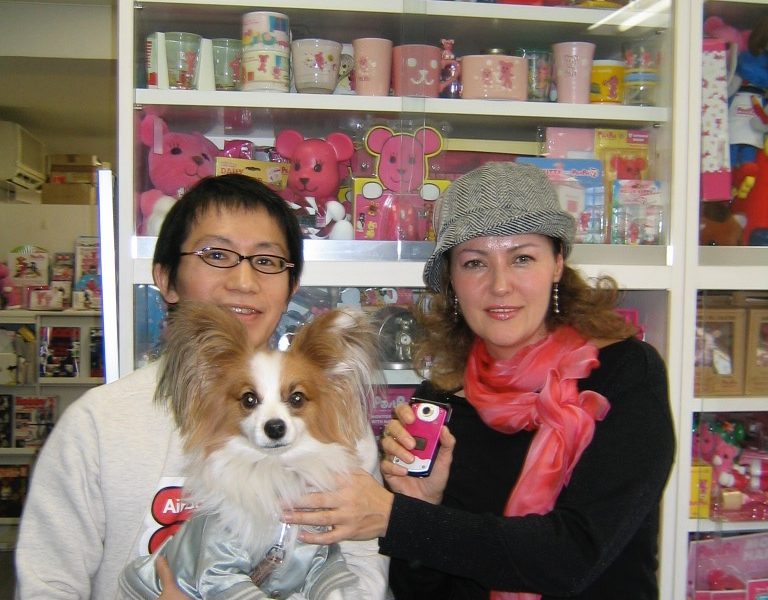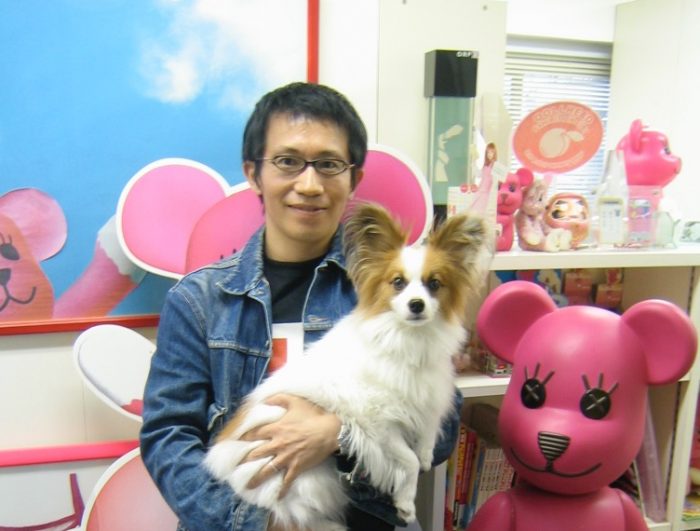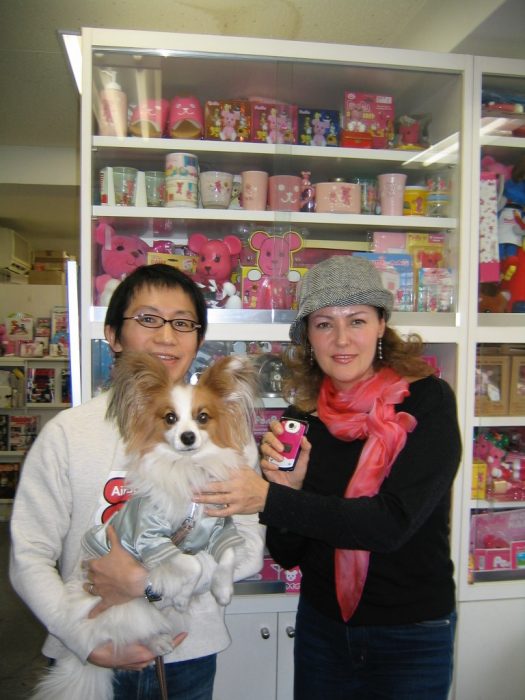
Words to Live by: Artist Kazuhiko Hachiya
Interview by Judit Kawaguchi
Amateurs can make professional quality. Before PostPet, I had never made any software but I saw the need for something to assist people in communicating on the computer. Especially because at that time software was made by tech geeks who had trouble talking, even through the Internet, so what they made was too difficult to use. This was back in 1995, when it was mostly guys who were using e-mail, and we definitely needed help. I wanted to make a fun software program for people new to the computer, especially for my women friends, and that was PostPet.
My pets are communication tools and luckily, they live forever. PostPet is a software that makes people happy. The little characters deliver your email and can even send you some on their own, so they make lonely people feel better and ease communication between humans.
I prefer low-budget prototype design over financial success. As long as we are not in the red, we are doing OK. That is enough.
My function as an artist is to guide engineers in the direction of better interface. Engineers are always thinking of functionality and since they have a lot of pressure to compete, they end up developing products that have way too many functions. I make those items easier to use.

I make fiction into reality. The base motif for my airplane is the one Nausicaa flew on. It is a handmade wooden structure with fiberglass reinforced plastic, and a jet engine; a mixture of classic and high tech.
The harder it is to succeed, the more fun it is. In order to test-fly my prototype airplane, I needed government permission, but since nobody has ever asked for such a document, officials had no clue what to do with my request. I had to wait for years, but I found every new document a pleasure to fill out. This whole process made the project all the more interesting, but I was getting a little anxious as I was more and more ready to fly.
Nowadays many people’s personal goals sound exactly the same as company goals, like how to make more money or move into a bigger place, but real happiness is different. Dreams have variations: mine is to make fun things.
My job is to make art, not to talk about it. What I want to say, I make it into art. My message is inside each project, not on the surface, but in their essence.
We must say thank-you more often. I made “Thanks Tails” for cars so drivers could express appreciation to the people behind them by wagging these tails like a dog.
The Japanese political system is like a kindergarten. We average Japanese are more adults than most politicians, even if we look and dress childish; we are not. They are. The difference is that while we are mostly cute, kind and innocent, they are egoistic and mean adult children.
I do not work for money, but for dreams. I guess that this in itself is a dream come true. My work should make other people happy, and hopefully me, too.
If I died right now, I would like to be back as me, at this age, doing the same thing. I’m so happy in my skin that I would not want to change anything.
I had to get stronger in order to fly. I have been doing Capoeira for years, and with mostly younger kids. Only then I feel my age —or older.
The best samurai never used his sword, but was always ready to fight. He was prepared for the worst but kept his calm at all times. This is me—or at least how I want to be. Today’s cool samurai, the real heroes, are the average working guys who take care of their families, but few people understand how hard these men work. I respect and admire them.
Japanese ministers are not professionals. For example, what kind of education and real work experience does the Minister of Education and Science have? Ministers lack the skills necessary for their positions, yet they are the nation’s leaders. Isn’t that weird?
Artists create and leave a legacy of art, so in my works, my daughter has a record of my life. I take my baby and wife with me to all the exhibits.
Housework is a breeze, thanks to all the engineers who developed the myriad of wonderful household items that make life easier. I buy just about any machine to help us, whether we really use them or not.
Through touching, we develop love. When I first saw my own baby, I didn’t feel so attracted to her. But the more time I spent holding and touching my little daughter, the more I developed love for her. I think most Japanese men don’t have enough time to be with their children so I wonder whether they can develop love for each other.
Having a child is like going back to my own past. I’m amazed how the baby influenced me. Seeing her opening my briefcase, I remember my own dad telling me not to do this when I was boy. As I hold her, I remember my feeling as a baby. So it is like I went back to my old self and experience the happiness I had felt as a child.
I want to take care of my parents in their old age, but probably if I didn’t have a baby, I wouldn’t feel that way. Now I know how parents have to sacrifice lot.
Art collecting is about supporting artists, not investing or making money. I collect art, small pieces, because I want to share the artist’s way of thinking.
Car accidents are common, yet we still drive. The Internet is the same; it’s full of dangers but we go on it anyhow.
Japanese art collectors are hidden and they usually don’t even come to openings. Basically nobody knows who buys what and why.
In the future we will communicate pretty much the same way as we do now. I don’t see big improvements in that area because ultimately what humans enjoy is sitting down with a friend talking and having a meal. For example, now we have TV phones, but so few people use them. Not much will change, I think.
Art’s purpose is to give happiness. The idea is the key, but viewers must feel happy looking or thinking about the piece. Most of my work is kawaii or cute, but all are about possibilities.
Cute is not always attractive. We Japanese and many other Asians love cute stuff, but I am not sure about the rest of the world.
Japan should welcome more and more foreigners. It might sound bad, but with the aging population, we need new blood and I prefer people over robots. I am sure the mixing will do us good. Robots are OK, too, though!
A version of this interview appeared in the Japan Times on January 10, 2006

This QuoteWe must say thank-you more often. — Kazuhiko Hachiya